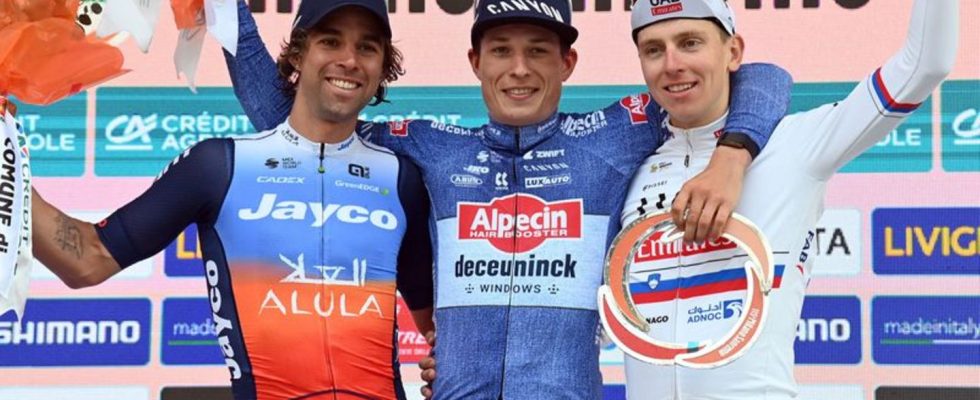Cycling
Classic Milan-Sanremo not hard enough for Pogacar
Belgian Jasper Philipsen (M) celebrates on the podium with second-placed Australian Michael Matthews (l) and third-placed Slovenian Tadej Pogacar. photo
© Gian Mattia D’Alberto/LaPresse/AP/dpa
The Italian spring classic has never been driven this fast in 115 years. Tadej Pogacar would have preferred to make his opponents suffer even more. A sprinter was able to celebrate in Sanremo.
“I actually think it was one of the easiest races ever. We drove at a super easy pace in the first few hours. But in order to win, everything has to be perfect. This time not everything was perfect,” analyzed the Slovenian, who was actually on the Cipressa, the penultimate climb that Sprinter wanted to get rid of. But his UAE team’s fast-paced work didn’t really work either. “As we have changed the way we race in recent years, everyone is prepared to suffer at the Cipressa and do well at the Poggio,” complained the 25-year-old.
Pogacar tried again on Poggio – the last climb – with two sharp attacks, but the Dutch world champion and last year’s winner Mathieu van der Poel led his rivals and thus also his fast teammate Philipsen closer again. “On the descent I begged Mathieu not to work with Pogacar because I had good legs. Mathieu did a wonderful job. I will always be grateful to him for giving me the chance to win a Monument,” said Philipsen .
Today there is a spectacle long before the finish line
Teamwork in perfection, and van der Poel would have loved to be the first driver since Erik Zabel (2001) to defend his title in Sanremo. “Oh, how I would have loved to go to the final with Tadej,” said van der Poel. Instead, Philipsen, who won four stages and the green jersey at the Tour de France last year, narrowly edged out Australian sprinter Michael Matthews and all-rounder Pogacar.
A scenario that has become increasingly rare in recent years. While hard-paced sprinters like Zabel, Mark Cavendish and Alessandro Petacchi used to regularly triumph in Sanremo, the races have changed fundamentally with the new generation of cycling. Today, spectacle is the order of the day for drivers like Pogacar, Remco Evenepoel and van der Poel long before the finish line. The best example was Pogacar’s 81-kilometer solo ride at the Strade Bianche gravel race two weeks ago.
In the next classics, Pogacar will now leave the field to his competitors; the Slovenian is aiming for the double of the Giro d’Italia and the Tour de France this year. Only at Liège-Bastogne-Liège, where he broke his scaphoid bone in a fall last year, will he compete against Evenepoel.
And the Germans? Georg Zimmermann was the best of only seven actors in 39th place. Somehow indicative of the crisis in German cycling, which is no longer represented at the top of the world. The last victory so far was won by John Degenkolb in 2015; the 35-year-old Thuringian was not there this time. His focus is on his favorite race, Paris-Roubaix. After all, he won’t meet Pogacar in the cobblestone ordeal.

